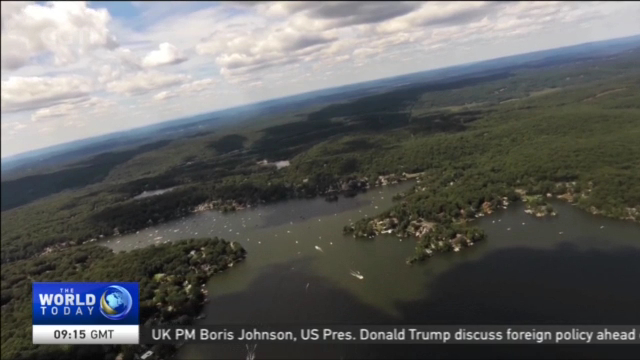
19:19, 24-Aug-2019
Climate Emergency: UN warns there is only 11 years to prevent a catastrophe
Updated
19:38, 24-Aug-2019

A UN panel says we have only 11 years to avert a climate catastrophe as the Earth heads for a rise in temperature of two degrees Celsius. Coastlines will disappear under rising sea levels, coral reefs will die off and Arctic ice sheets and glaciers could disappear in summer months within just five years. One analysis shows temperatures in the US state of New Jersey have already risen by almost two degrees since 1895. It's made the state's biggest lake, Lake Hopatcong too dangerous to swim in. CGTN's Karina Huber explains.
In the warm months, Lake Hopatcong, in the state of New Jersey, is usually bustling with swimmers and boaters. Not this summer.
The culprit? Harmful Algae Blooms or "HABS" that caused the New Jersey Department of Environmental Protection to issue advisories against going into the water. Local health authorities then closed many of the lake's public beaches.
Jessica Murphy grew up on the lake. She says she's never seen anything like it. The closures hit her family hard.
JESSICA MURPHY, PRESIDENT LAKE HOPATCONG FOUNDATION "My daughter at one point started crying. I was like 'what's the matter, honey?' and she was like 'I just want to swim so badly' and I'm like 'we all do.' It was a little heartbreaking."
It was also devastating for many of the businesses that surround the lake.
Sailing lessons were cancelled and people were laid off.
JESSICA MURPHY, PRESIDENT LAKE HOPATCONG FOUNDATION "Seeing these marinas and restaurants and other things around the lake just be left empty on what should be bustling weekends, it was hard to see."
The New Jersey Department of Environmental Protection said the rapid spread of the bloom may be the result of heavy rainfall carrying nutrient-laden stormwater into the lake followed by periods of warm weather.
The cyanobacteria blooms can cause a range of negative health effects for humans and can be deadly for animals.
KARINA HUBER NEW JERSEY "Three dogs died in the state of North Carolina this summer shortly after swimming in a pond with the same toxic algae blooms found in Lake Hopatcong. Other communities across the United States have been hit with unusually large algae blooms this summer including the state of Mississippi which had to shut down all of its beaches to swimming."
Scientists say climate change will make toxic algae blooms more prevalent.
Lake Hopatcong is a largely Republican district. There has been some resistance here to the notion that climate change is real. But environmentalist Elliott Ruga says people are coming around, in part, because of this summer's experience.
ELLIOTT RUGA, DEPUTY DIRECTOR NEW JERSEY HIGHLAND COALITION "We're not the ones who are going to suffer from sea level rises but climate change is not just confined to coastal communities and this is an example of how it will impact us. But fortunately, there are measures we can implement."
He and others are advocating for upgrading the area's stormwater systems to prevent phosphorus from entering the lake.
ELLIOTT RUGA, DEPUTY DIRECTOR NEW JERSEY HIGHLAND COALITION "Once they manage stormwater adequately. They have systems in place – they will last a very long time and they can actually add other values to the community and we could end up with a water quality in Lake Hopatcong that is better than even before the outbreak of HABS."
Murphy is optimistic the community will come together to find a solution.
JESSICA MURPHY, PRESIDENT LAKE HOPATCONG FOUNDATION "I know we'll all look back on 2019 with a little bit of heartbreak and frustration. But hopefully, going forward at some point we can look back and say well that was the year that a lot of great changes were made and helped make sure that we wouldn't have to face this again."
Karina Huber, CGTN, Lake Hopatcong, New Jersey.
SITEMAP
Copyright © 2018 CGTN. Beijing ICP prepared NO.16065310-3
Copyright © 2018 CGTN. Beijing ICP prepared NO.16065310-3